Atina Grossmann
Distinguished Professor of History
Atina Grossman is Professor of History in the Faculty of Humanities and Social Sciences at The Cooper Union in New York City. She received a Ph.D from Rutgers University and a B.A. from The City University of New York. Her current research focuses on “Trauma: Privilege, Adventure in Transit: Jewish Refugees from National Socialism in Iran, India, and Central Asia in Transnational Context.” She has been recently appointed to the Editorial Board of the American Historical Review (journal of the American Historical Association, HA) and to the Editorial Advisory Board of Holocaust and Genocide Studies (journal of the United States Holocaust Memorial Museum) and Member of the Scholars Advisory Board of the Museum of Jewish Heritage, Battery Park, NYC.
Recent Publications include Unser Mut/Our Courage: Juden in Europa/Jews in Europe 1945-1948 (2021) Catalogue for Exhibit at Jewish Museum Frankfurt August 31, 2021-January 15 2022. Co-editor and historical consultant for the exhibit which has traveled to Berlin and will continue to other European cities. “Trauma, Privilege, and Adventure in Transit: Jewish Refugees in Iran and India,” in, Jews and Colonialism, ed. Stefan Vogt (Bloomsbury 2022). “Holocaust Studies in Our Age of Catastrophe,” Journal of Holocaust Studies 35:2 (April 2021), Special Issue on “Confronting Hatred: Neo-Nazism, Antisemitism and Holocaust Studies Today.” “Hide and Seek,” in Her Story, My Story? Writing About Women and the Holocaust, ed. Judith Baumel Schwartz and Dalia Ofer (Peter Lang, 2021). “I Thought She was Old but She was my Really My Age: Tracing Desperation and Resilience in my Grandmothers’ Letters from Berlin,” in On Being Adjacent to Historical Violence, ed. Irene Kacandes (De Gruyter, 2021.
Books and Edited Volumes: Jews, Germans, and Allies: Close Encounters in Occupied Germany (Princeton University Press, 2007, German 2012), Wege in der Fremde: Deutsch-jüdische Begegnungsgeschichte zwischen New York, Berlin und Teheran (Jena, 2012), and Reforming Sex: The German Movement for Birth Control and Abortion Reform, 1920-1950 (Oxford University Press 1995); co-edited volumes on Crimes of War: Guilt and Denial in the Twentieth Century (with Omer Bartov and Mary Nolan, New Press 2002) and After the Nazi Racial State: Difference and Democracy in Germany and Europe (with Rita Chin, Heidi Fehrenbach, Geoff Eley, University of Michigan Press 2009), as well as Shelter from the Holocaust: Rethinking Jewish Survival in the Soviet Union, (with Mark Edele and Sheila Fitzpatrick, Wayne State University Press 2017) and The JDC at 100: Essays on the 100th Anniversary of the American Jewish Joint Distribution Committee, with Avinoam Patt, Linda Levi, Maud Mandel Mandel, (Wayne State, 2018), and (with Tamar Lewinsky) the chapter on 1945-1949 in Geschichte der Juden in Deutschland Von 1945 bis zur Gegenwart (ed. Michael Brenner, 2012, in English, A History of Jews in Germany: Politics, Culture, and Society, 2018,Indiana University Press, 2017).
Her book Jews, Germans, and Allies: Close Encounters in Occupied Germany (2007, German, Wallstein 2012) was awarded the George L. Mosse Prize of the American Historical Association and the Fraenkel Prize in Contemporary History from the Wiener Library, London. Fellowships include NEH, German Marshall Fund, Institute for Advanced Study, American Academy in Berlin, United States Holocaust Memorial Museum Mandel Center for Advanced Holocaust Studies, and the Davis Center at Princeton University; she has also held Guest Professorships at the University of Haifa, Friedrich Schiller University in Jena, and Humboldt University in BerlinHer current research focuses on “Remapping Survival: Jewish Refugees and Lost Memories of Displacement, Trauma, and Rescue in the Soviet Union, Iran, and India,” as well as the entanglements of family memoir and historical scholarship. She is on research and writing leave for the academic year 2022-23 as the Ina Levine Invitational Scholar at the Mandel Center for Advanced Holocaust Studies at the United States Holocaust Memorial Museum in Washington DC.
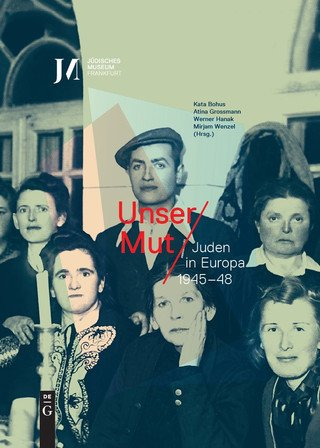 Unser Mut/Our Courage: Juden in Europa/Jews in Europe 1945-1948 (2021) Catalogue for Exhibit at Jewish Museum Frankfurt August 31, 2021-January 15 2022. Co-editor and historical consultant for the exhibit which will travel on to Berlin and other European cities.
Unser Mut/Our Courage: Juden in Europa/Jews in Europe 1945-1948 (2021) Catalogue for Exhibit at Jewish Museum Frankfurt August 31, 2021-January 15 2022. Co-editor and historical consultant for the exhibit which will travel on to Berlin and other European cities.
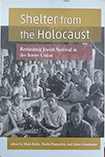 Shelter from the Holocaust: Rethinking Jewish Survival in the Soviet Union, eds. Mark Edele, Sheila Fitzpatrick, Atina Grossmann (Detroit: Wayne State University Press, 2017).
Shelter from the Holocaust: Rethinking Jewish Survival in the Soviet Union, eds. Mark Edele, Sheila Fitzpatrick, Atina Grossmann (Detroit: Wayne State University Press, 2017).
The JDC at 100: Essays on the 100th Anniversary of the American Jewish Joint Distribution Committee, eds. Avinoam Patt , Atina Grossmann, Maud Mandel, Linda Levi, (Detroit: Wayne State University Press, 2018).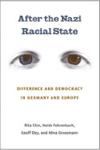 After the Nazi Racial State: Difference and Democracy in Germany and Europe (2009).
After the Nazi Racial State: Difference and Democracy in Germany and Europe (2009). Jews, Germans, and Allies: Close Encounters in Occupied Germany (2007) was awarded the Fraenkel Prize in Contemporary History from the Wiener Library in London; the George L. Mosse Prize of the American Historical Association (2007), and selected as one of the best books of the year (2008) by the HSKult ListServ in German social and cultural history.
Jews, Germans, and Allies: Close Encounters in Occupied Germany (2007) was awarded the Fraenkel Prize in Contemporary History from the Wiener Library in London; the George L. Mosse Prize of the American Historical Association (2007), and selected as one of the best books of the year (2008) by the HSKult ListServ in German social and cultural history.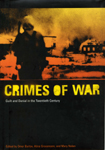 Crimes of War: Guilt and Denial in the Twentieth Century (co-edited; 2002)
Crimes of War: Guilt and Denial in the Twentieth Century (co-edited; 2002)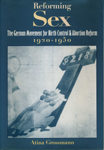 Reforming Sex: The German Movement for Birth Control and Abortion Reform, 1920-1950 (1995)
Reforming Sex: The German Movement for Birth Control and Abortion Reform, 1920-1950 (1995) When Biology Became Destiny: Women in Weimar and Nazi Germany, eds. Renate Bridenthal, Atina Grossman and Marion Kaplan(1984)
When Biology Became Destiny: Women in Weimar and Nazi Germany, eds. Renate Bridenthal, Atina Grossman and Marion Kaplan(1984)





